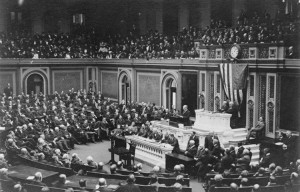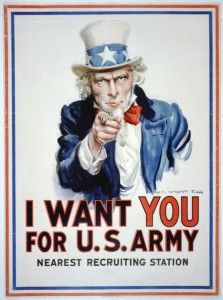U.S. Enters World War I: 100 Years
Thursday, April 6th, 2017April 6, 2017
On April 6, 1917—100 years ago today—the United States House of Representatives approved a resolution declaring war on Germany, entering the United States into World War I (1914-1918). Four days earlier, U.S. President Woodrow Wilson had asked Congress for a declaration of war, warning “the world must be made safe for democracy.” The Senate approved the resolution by a vote of 82-6 on April 4.

U.S. soldiers wave goodbye from a troop ship bound for France in 1917. Credit: © Everett Historical/Shutterstock
At the start of World War I, President Wilson declared the neutrality of the United States. Most Americans initially opposed U.S. involvement in a European war. However, Germany’s sinking of the Lusitania and other actions against civilians drew American sympathies to the Allies–namely France, Italy, Russia, and the United Kingdom.

President Woodrow Wilson asks Congress to declare war on Germany on April 2, 1917. Credit: Library of Congress
Several events early in 1917 persuaded the U.S. government to enter the “war to end all wars.” In February, Germany returned to unrestricted submarine warfare. German military leaders knew this decision might bring the United States into the war, but they believed they could win the war by cutting off British supplies. Germany hoped to win the war before the United States could fully mobilize (call up troops) and land an army in Europe.
Tension between the United States and Germany further increased as a result of the “Zimmermann telegram.” The telegram was a message from Germany’s foreign minister, Arthur Zimmermann, to the German ambassador to Mexico. The British intercepted and decoded the message in January and relayed the message to the United States in late February. The message revealed a German plot to persuade Mexico to go to war against the United States. News of the plot infuriated an American public already upset by the sinkings of U.S. cargo ships by German submarines.
Wilson finally called for war, and Congress backed him up on April 6. However, the U.S. military at that time lacked experience, modern weapons, and a sufficient number of soldiers. It would be a year before enough American troops were in Europe to help the Allies defeat Germany.

“Uncle Sam” urges men to enlist in the U.S. Army in this poster from 1917. Credit: © Leslie-Judge Co./Library of Congress
Germany wasn’t the only U.S. enemy in World War I. On Dec. 7, 1917, Congress approved a resolution declaring war on Austria-Hungary, Germany’s main ally. The United States never declared war on Germany’s other biggest ally, the Ottoman Empire.


